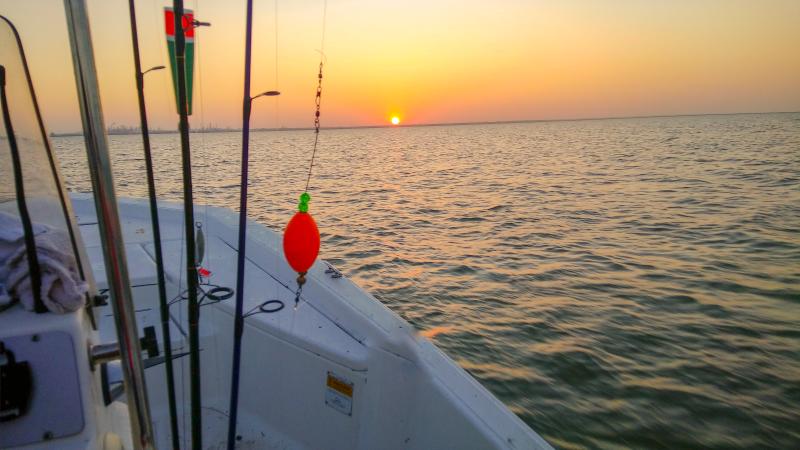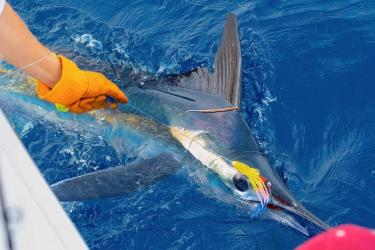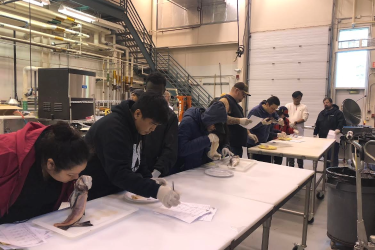As the country starts to thaw after a long, cold winter, people look forward to getting outside again. Spending time on the water is one of the best ways to soak up the warm sun and nothing says summer like a day of fishing! But how do you find and catch “the big one?” Many people choose to hire a professional guide or captain to help them catch that special fish that leads to lots of future “fish tales.”
The Southeast is home to more types of fishing opportunities and charter boat captains than any other area of the United States. When you make the decision to go out on the water, you need to do some homework in advance. Federally permitted captains are committed to making sure you have a fun, safe day on the water. All federal permits require safety equipment and inspections by government agencies like the U.S. Coast Guard. Success for a for-hire charter captain is really dependent on providing great experiences for their customers with the hopes of return business and positive word of mouth.
Unfortunately, not everyone plays by the rules. NOAA Fisheries has noticed a rising trend in complaints of businesses operating illegally and using unpermitted charter boats in federal waters. These operations do not have permits to fish in federal waters, but often advertise that they do. In addition to not having federal permits, these charters do not undergo safety inspections. They may or may not have the necessary safety gear in case of an emergency at sea.
Federal water laws are different based on where you are. There are state-permitted professional charter boats who may legally fish in state waters only. This area is 3 miles off the coast of most states. In a few areas, like the west coasts of Florida and Texas, state waters extend out to 9 miles.
These days, many people wouldn’t go to a restaurant, visit a salon, or even buy a major appliance without doing some research. So why would anyone start a day on the water, where safety is a huge factor, without knowing what to expect or at least reading some online reviews?
Safety
Safety is the most important reason to do your research. Permitted and large inspected charter boats carry a variety of safety gear like life rafts and water-activated floating GPS distress beacons.
Making Good Choices
Ask to see one if you never have. You need to verify some of the safety gear and learn more about what it is used for. Federal captains must undergo first aid and CPR training, and receive a medical physical.
“Anyone paying for a trip on a passenger vessel should ask to see the Merchant Mariner Credential of the boat operator to verify their captain is properly licensed by the Coast Guard,” according to United States Coast Guard Sector St. Petersburg Senior Investigating Officer Brian Knapp. “If the captain can’t produce a Merchant Mariner Credential, don’t get on the boat.”
Fishing Fair
NOAA permits are usually between $12 and $25. However, the secondary market for areas with limited entry can cause the price of a permit to rise well above that federal price. In the Gulf of Mexico, for example, federal for-hire permits cost upwards of $30,000 in a secondary market driven by supply and demand. These permit costs do not even include the required safety equipment, medical training, and examinations. Those businesses are operating illegally and hurting their fellow fishermen who do operate legally.
The downside for you as the customer would be in the event of a boarding by law enforcement. Citations or penalties could be issued by a law enforcement officer during your trip. This experience could not only ruin your day on the water, but your entire vacation.
Check the BOXES
There is a quick way to check all the important boxes before you book a trip.
Be on the lookout for proper permits and licenses. Ask if they are federally permitted? If your dream fish is mahi mahi, wahoo, grouper or other deep water fish, odds are you will be fishing in federal waters. Find out if you need a license. Many states include your fishing license with the charter vessel permit.
Only speak for yourself—do not be coached. If the captain or crew “coaches” you on what to say if or when approached by law enforcement, that is a big red flag.
EXamine the safety gear—is it there, where is it located?
Educate yourself before you go—look up the captain, company, and reviews. Often times non-permitted captains quietly advertise on social media or other free web platforms. They use language like “We can go fishing as new friends and you just help pay your share of gas.” If a website seems a little hidden it may be for a reason.
Support conservation. Ask if they ever hook sea turtles and if so, what do they do to safely release them? Permitted captains are required to have specialized equipment onboard to safely release sea turtles while doing little harm to them. It would be a good way to spend some down time if moving to a different fishing spot or just getting to know the boat and crew.
Help Us Help You
If you are reading this and you think you may have already experienced a trip aboard an illegal charter, please let us know. There is a way you can protect legally permitted charter boat captains. Officials with NOAA’s Office of Law Enforcement seek information from anyone who may know of a business operating illegally in federal waters of the Gulf of Mexico and South Atlantic region. Please call the NOAA Enforcement Hotline at (800) 853-1964. The Office of Law Enforcement may, on a case-by-case basis, issue rewards to individuals who provide information concerning unpermitted moratorium charter activity that leads to a successful prosecution. Information may also be left anonymously.
Empower yourself by being a more informed angler and charter customer. Enjoy a day on the water without the fear of not being properly prepared or being stopped by law enforcement because your captain is operating illegally. Remember, the fishermen who operate illegally do so at the expense of their peers, the fishery, and most importantly—you.



